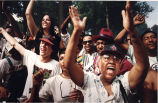Observing Juneteenth

June 19 is also known as Juneteenth, the anniversary of the formal end of slavery in Texas, the last slaveholding state of the Confederacy. This year marks the 150th anniversary of Juneteenth.
Though technically slaves held in Confederate states had been freed by the Emancipation Proclamation in 1863, in practical terms, many slaves were unable to avail themselves of this freedom. As slaveholders fled their land in the wake of Union victories, taking their slaves with them, slaves and slaveholders alike poured into the interior of Texas, largely isolated from most fighting and from Union attempts to occupy the state, which tended to be limited to the Texas coastlines. Texas was slaveholders’ last refuge, and its population include approximately 250,000 slaves. When Union forces entered Galveston on June 19, 1865, General Gordon Granger found it was necessary to issue a direct order notifying Texans that “all slaves are free.”
This was a mixed victory for the newly freed slaves, who, on the one hand, had finally been granted freedom, but who also faced increased violence. Nevertheless, “Juneteenth” was a cause for celebration in Texas throughout the nineteenth century and into the twentieth century. During the Great Migration, as African-Americans moved out of the South and across the country, Juneteenth traditions traveled with them. In 1979 Texas declared Juneteenth a state holiday, and in 1997 Congress recognized the day as Juneteenth Independence Day through Senate Joint Resolution 11 and House Joint Resolution 56.
For more information about Juneteenth, see:
- Elizabeth Hayes Turner, “Juneteenth: Emancipation and Memory,” in Lone Star Pasts: Memory and History in Texas, ed. Gregg Cantrell and Elizabeth Hayes Turner (2007; essay available via Google Books)
- “Juneteenth,” The Handbook of Texas
- Lula Briggs Galloway, Juneteenth: Ring the Bell of Freedom (1998)
- Francis Abernethy, Juneteenth Texas: Essays in African-American Folklore (1996)
- Kathlyn Gay, African-American Holidays, Festivals, and Celebrations (2007)
- Judith Berg-Sobré, San Antonio on Parade: Six Historic Festivals (2003; includes chapter on Juneteenth festival)
- Isabel Wilkerson, The Warmth of Other Suns: The Epic Story of America’s Great Migration (2010)
 Ralph Ellison’s final novel, Juneteenth, published after his death, draws on this holiday for its title,
Ralph Ellison’s final novel, Juneteenth, published after his death, draws on this holiday for its title,
To learn about historical Juneteenth celebrations and events in Atlanta, try searching using the term “Juneteenth” in our historical Atlanta Daily World and Atlanta Constitution databases and in the Atlanta Historic Newspapers Archive.
Our African-American Studies research guide also includes many other resources for learning more about African-American history.